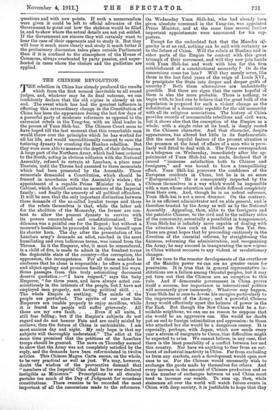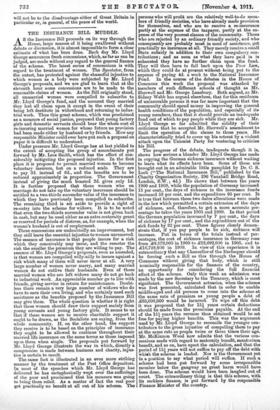THE CHIN - ESE REVOLUTION.
THE rebellion in China has already produced the results which from the first seemed inevitable to all sound judges, and, whatever may be its final outcome, we can confidently declare that the old regime is already at an end. The event which has had the greatest influence in effecting this extraordinary change in the Constitution of China has been the appearance during the last few days of a powerful party of moderate reformers as opposed to the extremist rebels in the Yang-tse, with an ideal leader in the person of Yuan Shih-kai. The Chinese Court seem to have hoped till the last moment that this remarkable man would throw over the principles which he has worked for all his life, and would unconditionally consent to save the tottering dynasty by crushing the Hankau rebellion. But they were soon able to measure the depth of their delusions. A large part of the Northern Army, which had been ordered to the South, acting in obvious collusion with the National Assembly, refused to entrain at Lanchau, a place near Tientsin, until the Throne had assented to three memorials which had been presented by the Assembly. These Memorials demanded a Constitution, which should be framed in accordance with the Assembly's wishes ; the appointment of a capable Prime Minister to form a Cabinet, which should contain no members of the Imperial family ; and finally the amnesty of all political offenders. It will be seen that the only important distinction between these demands of the so-called loyalist troops and those of the rebels themselves is that, while the latter ask for the abolition of the Monarchy, the former are con- tent to allow the present dynasty to survive with its powers emasculated and constitutionalized. The dilemma was a painful one for the Regent ; but without a moment's hesitation he proceeded to impale himself upon its shorter horn. The day after the presentation of the Lanchau army's demands an edict, couched in the most humiliating and even ludicrous terms, was issued from the Throne. In it the Emperor, who, it must be remembered, is a child of five, is made to admit in the frankest terms the deplorable state of the country—the corruption, the oppression, the incompetence. For all these scandals he confesses that he alone is responsible : he offers a profuse and abject apology and promises finally to mend his ways. Some passages from this truly astonishing document deserve quotation :—" I have reigned," says the baby Emperor, " for three years, and have always acted. con- scientiously in the interests of the people, but I have not employed men properly, not having political skill. . . . The whole Empire is seething. The minds of the people are perturbed. The spirits of our nine late Emperors are unable properly to enjoy sacrifices, while it is feared the people will suffer grievously. All these are my own fault. . . . Even if all unite, I still fear falling; but if the Empire's subjects do not regard and do not honour Fate and are easily misled by outlaws, then the future of China is unthinkable. I am most anxious day and night. My only hope is that my subjects will thoroughly understand." The edict at the same time promised that the petitions of the Lanchau troops should be granted. The news on Thursday seemed to show that the Army was not completely satisfied by the reply, and the demands have been reformulated in twelve articles. This Chinese Magna Carta seems, on the whole, to be very practical as well as just. We may, however, doubt the wisdom of the provocative demand that "'members of the Imperial Clan shall be for ever declared ineligible as Ministers." Proscriptions to all eternity partake too much of the Day of Judgment for mundane constitutions. There remains to be recorded the most important of all the concessions made to the reformers. On Wednesday Yuan Shih-kai, who had already been given absolute command in the Yang-tse, was appointed Prime Minister, and at the same time several further important appointments were announced for his sup- porters.
Except for the undoubted fact that the Manchu 4,i- garchy is at an end, nothing can be said with certainty as to the future of China Will the rebels at Hankau and in other parts of the Empire be content with this great triumph of their movement, and will they now join hands with Yuan Shih-kai and work with him for the firm establishment of a constitutional monarchy ? Or do the concessions come too late ? Will they merely serve, like those in the last fatal years of the reign of Louis XVI., to precipitate the State into deeper and deeper gulfs of anarchy ? Both these alternatives are undoubtedly possible. But there are signs that the more hopeful of them is also the more probable. There is nothing, to begin with, to lead one to believe that the great bulk of the population is prepared for such a violent change as the substitution of a democratic republic for the old. monarchy with all its religious associations. The history of China provides records of innumerable rebellions and civil wars, but it shows also that the conception of the Empire as a whole, with a single ruler at its head, is deeply rooted in the Chinese character. And that character, despite appearances, has altered but little in its fundamentals. But the most hopeful feature of the present situation is the presence at the head of affairs of a man who is pecu- liarly well fitted to deal with it. The Times correspondent in a telegram on Wednesday, immediately after the ap- pointment of Yuan Shih-kai was made, declared that it caused "immense satisfaction both to Chinese and foreigners," and was bound to have a tranquillizing effect. Yuan Shih-kai possesses the confidence of the European residents in China, but he is in no sense " Europeanized." Ha is consequently respected by the Chinese themselves in a way which would be impossible with a man whose education and ideals differed. completely from their own. And, though he is an ardent reformer, Yuan Shih-kai is not a mere dreamer. On the contrary, he is an efficient administrator and an able general, and is therefore trusted by the Army as well as by the National Assembly. Appealing, then, alike to the foreigners and the patriotic Chinese, to the civil and to the military sides of the community, essentially a possibilist in temperament, Yuan Shih-kai is infinitely more capable of dealing with the situation than such an idealist as Sun Yat Stn. There are great hopes that by proceeding cautiously in the direction of the essential reforms, by straightening the finances, reforming the administration, and reorganizing the Army, he may succeed in inaugurating the new regime in China without recourse to any violent or revolutionary changes.
If we turn to the remoter developments of the overthrow of the Manchu power we can see no greater cause for pessimism. It is true that in general representative in- stitutions are a failure among Oriental peoples, but it may yet turn out that the Chinese are an exception to this rule. And if democratic government in China proves itself a success, her importance in international politics will necessarily grow immensely. Whatever may happen, Yuan Shih-kai is sure to devote his energies particularly to the improvement of the Army ; and a powerful Chinese Army would effectively upset the balance of power in the Far East. But though the New China would be a for- midable neighbour, we can see no reason to suppose that she would be an aggressive one. She would no doubt put an end. to foreign intimidation and oppression: to those who attacked her she would be a dangerous enemy. It is especially, perhaps, with Japan, which now sends every year a stream of emigrants to Corea, that difficulties might be expected. to arise. We cannot believe, in any case, that there is the least possibility of a, conflict between her and this country. Nor have we anything to fear from an out- burst of industrial inactivity in China Far from excluding us from any markets, such a development would open new ones to us. For the Chinese would necessarily wish to exchange the goods made by themselves for others. And every increase in the amount of Chinese production and so in the number of exchanges between us and China must tend to increase our wealth. To sum up, then, while statesmen all over the world will watch future events in China with deep anxiety, it is justifiable to hope that they will not be to the disadvantage either of Great Britain in particular or, in general, of the peace of the world.







































































 Previous page
Previous page